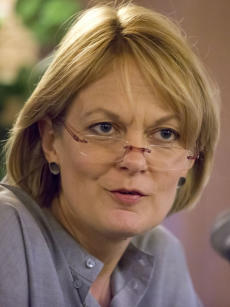No Religion as a “New Religion”?
Sociologist Linda Woodhead assumes Hans Blumenberg Visiting Professorship at the Cluster of Excellence – Research on the growing number of non-religious people in Europe and the USA – Public lecture on 8 May, “Is ‘No Religion’ the New Religion?”

Press release of the Cluster of Excellence of 28 April 2017
The current Hans Blumenberg Visiting Professor at the Cluster of Excellence “Religion and Politics” of the University of Münster, Prof. Dr. Linda Woodhead researches the growing number of non-religious people worldwide, the “nones”. During her visiting professorship in the summer semester, the British sociologist of religion will analyse the group of those people who are not members of an organised religion – but are not all secular or atheists either. She will research the reasons why an ever growing number of people, particularly younger ones, are unaffiliated with any organised religion and why the Christian majority is diminishing in some countries. The scholar from Lancaster University will discuss the extent to which no religion is the “new religion” in a public lecture on Monday, 8 May. All those who are interested are invited to attend.
The English lecture “Is ‘No Religion’ the New Religion?” will be held in the lecture building of the Cluster of Excellence, room JO 101, Johannisstraße 4 in Münster at 6.15 pm and will present survey findings and other information on powerpoint slides. In a public book presentation on Tuesday, 2 May, Prof. Woodhead will discuss questions of religious plurality and interreligious theory with scholar of religion Prof. Dr. Perry Schmidt-Leukel and Islamic theologian Prof. Dr. Mouhanad Khorchide. The event will be conducted in English in the lecture building of the Cluster of Excellence, room JO 101, Johannisstraße 4 in Münster from 11.15 pm to 12.45 am. Prof. Woodhead will also exchange views about the group of the “nones” in Europe and the USA with members of the Cluster of Excellence and scholars from across Europe and the USA in an interdisciplinary Blumenberg workshop on 4 and 5 May.
“Linda Woodhead distinguished herself with her ‘spiritual revolution’ theory”, says the speaker of the Cluster of Excellence, sociologist of religion Prof. Dr. Detlef Pollack. “With this she describes a structural change of religion in modern societies through which new individualistic and syncretistic religious forms gain in importance and increasingly supersede declining ecclesial ties.” Her book that aroused international interest, “The Spiritual Revolution” (co-written with Paul Heelas, 2005) is based on studies about Christian and alternative spirituality in England.
Discussing religious plurality with Schmidt-Leukel and Khorchide
“In her research Linda Woodhead is concerned with secularisation, religion and gender as well as the relationship of religion and emotion”, says Prof. Dr. Detlef Pollack. “This offers numerous intersections with the research at the Cluster of Excellence.” Her long experience in interdisciplinary research also makes Prof. Woodhead a valuable addition to the Cluster of Excellence. From 2007 until 2012, the new Blumenberg Visiting Professor was director of the UK’s 20m euro interdisciplinary “Religion and Society research programme” funded by the Arts and Humanities Research Council and the Economic and Social Research Council. (ill/vvm)

